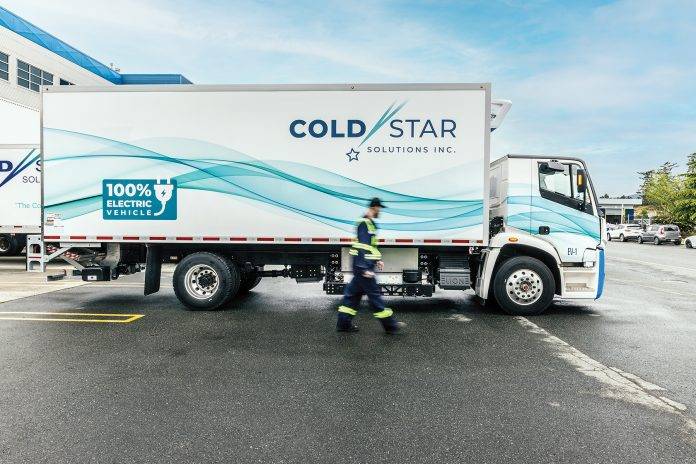ColdStar’s Five Tonnes of Greener and Cleaner Technology
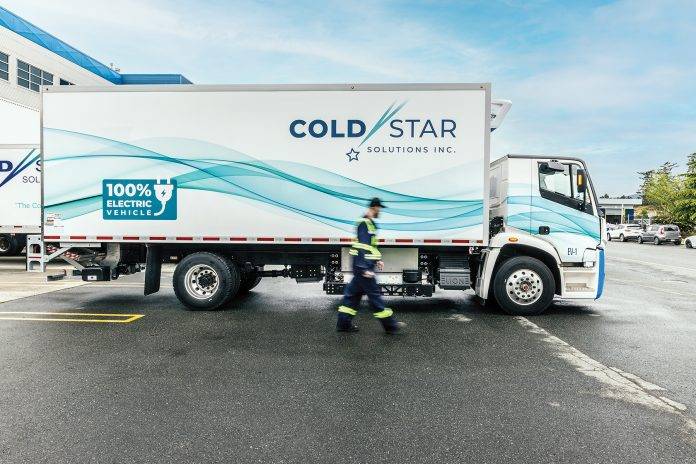
In late May, Kelly Hawes watched as a five-tonne reefer truck left a Langford warehouse, loaded with groceries for delivery throughout Greater Victoria. Though it was early in the morning, a tiny piece of Hawes probably felt like popping the cork on a bottle of champagne.
Normally, the coming and going of trucks would be mundane footnotes in a routinely hectic schedule that sees his company, ColdStar Solutions Inc., delivering between 800,000 and 1 million pounds of groceries every day to stores throughout Vancouver Island.
But this delivery was different; it marked the flagship run of ColdStar’s first fully electric delivery truck, and the culmination of more than a year of online searching, working with engineers to troubleshoot problems, wading through red tape for government grants and subsidies and flying back and forth across the country. Hawes’s excitement was tempered with trepidation, natural for anyone with skin in the game.
“I’m into this truck for about $475,000,” Hawes told Douglas magazine in an interview at the company’s Ladysmith distribution centre where workers were tying up loose ends in a newly renovated, 72-000-square foot cold storage warehouse.
And that doesn’t include the $77,000 he invested to build his own charging station at ColdStar’s Langford headquarters.
But financial responsibility is part of being an innovator, and without risk, there’s rarely reward. ColdStar is a growing Vancouver Island-based trucking company and grocery wholesaler with 175 employees.
Whether it’s bacon, eggs, canned soup, or lettuce, cheese and pretty much anything else in your pantry or fridge, chances are your groceries passed through a ColdStar warehouse and truck before hitting the shelves at your local store. It’s go time, all the time, at ColdStar and Hawes likes it that way. Being slightly ahead of the curve has been his modus operandi since launching ColdStar with his wife Jennifer, more than 20 years ago.
From the Forces to Food
Before trucking, Hawes was in the Canadian Armed Forces, trained to shoot missiles at tanks as a master bombardier. In 1994, he retired from the military, after a tour of duty serving at Canadian Forces Base (CFB) Shilo, and the now-mothballed bases at Chatham, New Brunswick and Baden-Soellingen, West Germany. Hawes wasn’t sure what was next. His dad owned a small trucking company in Victoria and needed a driver. It seemed like an easy option, so he got his commercial truck driver’s licence and started running the long haul from B.C. to California.
“I hated it,” he says bluntly.
Not the truck driving, but the long hauling. However, it wasn’t a total loss. Hawes saw a gap in grocery delivery in B.C. In particular, he noticed the lack of oversight in how perishables were handled by the trucking industry between the strictly regulated producer, wholesaler and retailer stops on the supply chain.
“I wanted to do a better job at delivering groceries on Vancouver Island,” he says, summing up a business idea that in hindsight seems general and unfocused.
The Road to a Greener Journey
But his instinct was right. In 1999, he and Jennifer started ColdStar, intending to be the first trucking company in western Canada to be food safety certified. It turned out to be an eight-year process, but they got there eventually.
As the trucking company matured, Hawes turned his attention toward ColdStar’s fuel bills and emissions, which led to the 2014 purchase of 10 CNG (compressed natural gas) trucks, his first big step toward a greener truck fleet. Compared to conventional diesel-burning tractor trailers that pump out nasty toxins like nitrous oxide and volatile organic compounds, CNG motors are more efficient, burn cleaner, and reduce greenhouse gas emissions by up to 20 per cent.
CNG trucks also require less maintenance over the long term. Today, more than half of ColdStar’s fleet of 45 trucks (10 of which are driver-owned) are CNG-powered. But in recent years, when Hawes went shopping for more CNG trucks, he found delivery wait times in the 16-months to two-year range. In some cases, manufacturers wouldn’t even provide a ballpark delivery date.
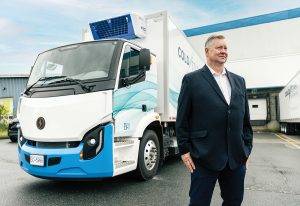
“Part of the issue is that none of the original equipment manufacturer companies, such as Freightliner, manufacture trucks in Canada anymore,” Hawes says.
In 2001, Daimler Chrysler closed its Western Star Trucks assembly plant in Kelowna. PACCAR, a Bellevue, Washington-based company that owns the Kenworth, Peterbilt and DAF trucking brands, operates an assembly plant in Sainte-Thérèse, Quebec. Otherwise, most transport trucks for the North American market are built and assembled in the United States. Given current exchange rates, it puts Canadian truckers at a price disadvantage when shopping for a new rig.
Making the Vision a Reality
Hawes was restless and impatient to continue the green conversion of his fleet. Early in 2021, he and Kyle Granger, ColdStar’s fleet and logistics manager, started thinking seriously about electrification. They felt mass conversion to electric power was still on the distant horizon for the trucking industry but nonetheless coming eventually. The fact that these days truckers are facing some of the highest fuel prices at the pumps that North America has ever witnessed, added wind to their sails in the search for cleaner transportation options.
“We’ve always wanted to be early adopters of green tech,” Hawes says.
However, there was a problem: nobody in North America was making a market-ready, five-tonne fully electric-powered reefer truck, exactly the vehicle Hawes needed for making short-haul deliveries on Vancouver Island.
On the plus side, the technology and expertise existed. It was just a matter of finding partners and assembling a team. It would turn out to be an all-star Canadian team. ColdStar’s quest first took them to the doorstep of Lion Electric Company, a publicly-traded, Quebec-based pioneer in the electric-powered school bus and cube-style commercial truck market.
“I flew out to Montreal late last year, and we basically sat down and designed a truck,” Hawes explains.
Ron Mearns, Lion’s national business development manager, joined the company in November when Lion was already a year into discussions with ColdStar. In February 2022, ColdStar ordered a Lion cab and chassis, powered by an electric motor with a 200-kilometre range.
“I have to commend ColdStar for taking the leap. They were very proactive,” says Mearns, adding that there are currently 550 Lion trucks and buses on the road in North America.
The ColdStar collaboration comes at a time when Lion is set to scale up production with a new plant on the outskirts of Chicago. Scheduled to open at the end of 2022, the facility will have an annual production capacity of 25,000 vehicles — 10 times the capacity of Lion’s Montreal facility.
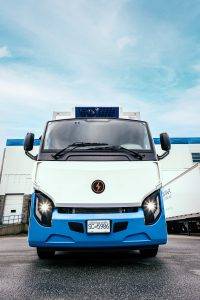
For the next step in the process, an insulated box, Hawes turned to another Quebec company, Fourgons Leclair, a family-owned business that manufactures specialized truck bodies. Once Fourgons Leclair fitted the truck with a box, Lion loaded it onto a flatbed, trucked it across Canada to Vancouver and delivered it into the hands of the third partner in this project — and another Canadian green tech pioneer — Volta Air Technology Inc. Engineers Peter Johnston and Steve Zaari founded the company in 2014.
Funded by a $1.2-million federal government grant, the partners worked with engineers at the University of Waterloo and Simon Fraser University to develop North America’s first fully electric reefer system as a green alternative to conventional diesel burning refrigeration units. Zaari says their intention was to dovetail Volta Air’s reefer technology with the development and commercialization of fully electric-powered commercial trucks.
But that market has proven more sluggish than Zaari expected. For example, Mosaic Forest Management, which manages private timberland on Vancouver Island, made a minor splash in 2021 when it announced plans to test Tesla logging trucks in its operations, but those trucks have yet to be delivered.
With electrification slow to arrive to the trucking industry, Volta Air made a minor pivot and focused on installing electric refrigeration units on trucks with diesel engines — kind of a cup half-full win for green transportation. That’s why Zaari says he was especially excited to partner with ColdStar and work with Lion Electric Company, which he refers to as the “Tesla of trucks.”
He also gives Kelly Hawes kudos for being “adventurous and not afraid to try new things.”
“This is a completely Canadian story, and that’s something I’m very proud of,” says Zaari, whose other company, Cool-It Group, has been in the business of refrigeration maintenance since 1989. “I believe that we’ll see this truck as a production vehicle in the future.”
Ron Mearns also hopes new business will result from the project. “We’re not quite there in terms of price point. But I think if we can scale up and start manufacturing more of our inputs, we can get the cost down.”
Batteries are key to reducing production costs. They account for 40 per cent of the cost of every truck and bus that comes off Lion Electric Company’s assembly line. The company has been at the mercy of third-party suppliers, forcing them to design trucks around the battery producer’s specifications, rather than the other way around.
This will change at the end of 2022 when Lion opens its own battery manufacturing facility in Montreal. It’s a similar story at Volta Air Technology in Vancouver. Battery technology is the critical component and is the reason the company is working with a local partner, Richmond-based Discover Batteries.
“We enjoy the lower cost, easy access and quick software updates on either side to match. We also trust the batteries inside out, unlike those we don’t know,” Zaari says.
Electrifying and Electric
For now, this is a one-off experiment for Hawes. He’s obviously proud of the project but doesn’t let pride get in the way of practicality. He has no proprietary interest in the technology or any interest at all in patents. And he’s under no illusion that electric power is beyond reproach when it comes to environmental impact; their manufacturing process has a carbon footprint and so does the mining of lithium for batteries. But between electric and CNG-powered trucks, he’s determined to wean his fleet off diesel completely.
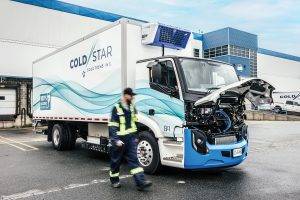
As for the inaugural fully electric grocery deliveries, Hawes says, “So far, so good.” He’s looking forward to crunching a few months of operational data, but initial numbers are more than promising; they’re actually electrifying. Operating costs for the new truck are coming in at around three cents per kilometre, or $4.50 to drive a 150-kilometre route. “A diesel truck doing the same route at today’s fuel price would cost at least $125.”
But at more than twice the manufacturing cost of a comparable CNG truck, this electric-powered blend of Lion Electric, Fourgons Leclair, and Volta Air Technology needs to come way down in price. To help soften the financial investment, Hawes is hoping ColdStar will be approved for a grant from the provincial Specialty-Use Vehicle Incentive Program, in addition to a CleanBC grant. With or without the grants, he says he would have taken the electrification leap.
Hawes is a straight-shooting character, trained in the military and the school of life. He likes military metaphors for their simple, if sometimes, brutal honesty. Nearly 40 years ago, as a fresh recruit, he asked his battle school instructor what makes a good leader. The sergeant told him that leadership is being the first one out of the trenches when the bullets are flying and knowing that everyone is right behind you.
Hawes pressed him.“I then asked him, ‘So how do you make that happen?’ and he just smiled and said that it was up to me to figure that out,” Hawes says. “I think about that all the time.”
Years later, Hawes is living that truth. He was the first one out of the trenches in B.C. to get a fully electric commercial transport truck on the road, and frankly hasn’t had time to look in the rearview mirror to see if any other truckers are following him over the top. The last year has been a whirlwind for Hawes. If nothing else, the electrification journey has connected ColdStar with some innovative leaders in Canadian green tech to find a made-in-Canada, forward-thinking solution to a trucking problem.
And who knows, “One day that little five-tonne electric reefer truck that could, might end up on an assembly line?
“If we can get the cost of this truck down to $250,000, I think we’ll be on to something,” Hawes says.
Source: douglasmagazine.com

